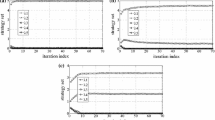Abstract
In the paper, we consider the imperfect channel state information (CSI) in practical cognitive MIMO systems. We first analyze the feedback of quantified CSI from the primary user (PU) and propose a joint power allocation and beamforming algorithm via game theory. Compared with the game under the condition of perfect CSI, new utility function and cost function are constructed under imperfect CSI. We analyze the error introduced from the uniformly quantified CSI and obtain new constraints. Besides, existence of the Nash equilibrium in case of both perfect CSI and imperfect CSI are proven. We propose a new iterative algorithm to reach the Nash equilibrium (NE). Simulation results show that the proposed algorithm can converge quickly.






Similar content being viewed by others
References
Federal Communications Commission (2003) Facilitating opportunities for flexible, efficient, and reliable spectrum use employing cognitive radio technologies. Notice of Proposed Rule Making and Order FCC 03–322
Mitola J, Maguire GQ (1999) Cognitive radio: making software radios more personal. IEEE Pers Commun 6(4):13–18
Gesbert D, Shafi M, Shiu D, Smith PJ, Naguib A (2003) From theory to practice: an overview of MIMO space-time coded wireless systems. IEEE J Select Areas Commun 21(3):281–302
Scutari G, Palomar DP, Barbarossa S (2008) Cognitive MIMO radio. IEEE Signal Process Mag 25(6):46–59
Rashid F, Liu KJR, Tassiulas L (1998) Transmit beamforming and power control for celluar wireless systems. IEEE J Select Areas Commun 16(8):1437–1450
Rashid F, Tassiulas L, Liu KJR (1998) Joint optimal power control and beamforming in wireless networks using antenna arrays. IEEE Trans Commun 46(10):1313–1324
Zhang R, Chai C, Liang Y (2009) Joint beamforming and power control for multiantenna relay broadcast channel with QoS constraints. IEEE Trans Signal Process 57(2):726–737
Zhang L, Liang Y, Xin Y (2008) Joint beamforming and power allocation for multiple access channels in cognitive radio networks. IEEE J Select Areas Commun 2(1):38–51
Islam MH, Liang Y, Hoang AT (2008) Joint power control and beamforming for cognitive radio networks. IEEE Trans Wirel Commun 7(7):2415–2419
Zhang R, Liang Y (2009) Exploiting multi-antennas for opportunistic spectrum sharing in cognitive radio networks. IEEE J Select Top Signal Process 2(1):88–102
Tang J, Lambotharan S (2011) Beamforming and temporal power optimisation for an overlay cognitive radio relay network. IET Signal Process 5(6):582–588
Jung M, Hwang K, Choi S (2011) Interference minimization approach to precoding scheme in MIMO-based cognitive radio networks. IEEE Commun Lett 15(8):789–791
Zhang L, Liang Y, Xin Y, Vincent PH (2009) Robust cognitive beamforming with partial channel state information. IEEE Trans Commun 8(9):4143–4153
Du H, Ratnarajah T, Pesavento M, Papadias CB (2012) Joint transceiver beamforming in MIMO cognitive radio network via second-order cone programming. IEEE Trans Signal Process 60(2):781–792
Huang K, Zhang R (2011) Cooperative feedback for multiantenna cognitive radio networks. IEEE Trans Signal Process 59(2):747–758
Goodman D (2001) Network assisted power control for wireless data. Mob Netw Appl 6(5):409–415
Saraydar CU, Mandayam NB, Goodman D (2002) Efficient power control via pricing in wireless data networks. IEEE Trans Commun 50(2):291–303
Scutari G, Palomar DP (2010) MIMO cognitive radio: a game theoretical approach. IEEE Trans Signal Process 58(2):761–780
Zhao F, Lv X, Chen H (2013) A leakage-based beamforming algorithm for cognitive MIMO systems via game theory. J Networks 8(3):623–627
Zhao F, Zhang J, Chen H (2013) Joint beamforming and power allocation for multiple primary users and secondary users in cognitive MIMO systems via game theory. KSII Trans Internet Inf Syst 7(6):1379–1397
Nguyen DN, Krunz M (2013) Power minimization in MIMO cognitive networks using beamforming games. IEEE J Select Areas Commun 31(5):916–925
Zhao F, Li B, Chen H (2013) Joint beamforming and power allocation for cognitive MIMO systems under imperfect CSI based on game theory. Wirel Pers Commun 73(3):679–694
Wang J, Scutari G, Palomar DP (2011) Robust MIMO cognitive radio via game theory. IEEE Trans Signal Process 59(3):1183–1195
Song L, Han Z, Zhang Z, Jiao B (2012) Non-cooperative feedback rate control game for channel state information in wireless networks. IEEE J Select Areas Commun 30(1):188–197
Larsson EG, Jorswieck EA (2008) Competition versus cooperation on the MISO interference channel. IEEE J Select Areas Commun 26(7):1059–1069
Acknowledgments
This research was supported by the National Natural Science Foundation of China (61162008, 61172055), the Guangxi Natural Science Foundation (2013GXNSFGA019004), the Key Project of Chinese Ministry of Education (212131), the Foundation of Department of Education of Guangxi Province (201202ZD045), the Open Research Fund of Guangxi Key Lab of Wireless Wideband Communication & Signal Processing (12103, 12106), the Director Fund of Key Laboratory of Cognitive Radio and Information Processing (Guilin University of Electronic Technology), Ministry of Education, China (2013ZR02).
Author information
Authors and Affiliations
Corresponding author
Rights and permissions
About this article
Cite this article
Zhao, F., Wang, C., Chen, H. et al. Game-Theoretic Joint Power Allocation and Beamforming for Cognitive MIMO Systems with Finite Feedback. Mobile Netw Appl 19, 512–521 (2014). https://doi.org/10.1007/s11036-014-0500-4
Published:
Issue Date:
DOI: https://doi.org/10.1007/s11036-014-0500-4



